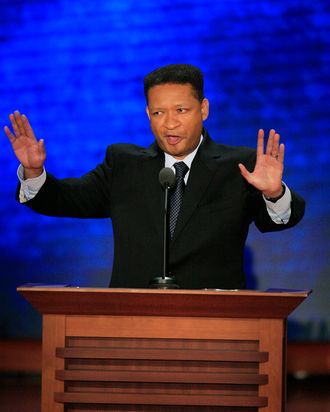
Almost every political writer I know who isn’t a straight white man has made the joke at least once: If I ever need a major operation or find myself in serious debt, I’m selling out and going conservative. There’s a tried-and-true formula for this: Rise to a moderate level of success as a liberal-leaning writer, politician, or commentator. Drop out of the spotlight for a few months or years, then reemerge as a beautiful conservative swan, disavowing everything you said in your liberal ugly duckling days. You were just brainwashed, you’ll say, following the script. Now you know the truth: that everything you have, you have because you worked for it yourself. Sure, straight white politicians cross over, too — but to far less effect. In a party full of Clint Eastwoods, who’s going to sit up and take notice when there’s one more?
This year’s poster child for Dem-Republican conversion is Artur Davis, who was not only a Democratic representative but the recruiting chair for the Democratic Congressional Campaign Committee.*
In 2008, asked what liberal Democrats had in common with moderate Democrats, he cited a shared belief that “the people who don’t get a fair shot are owed something by those of us who’ve had things go very well in our lives, and it’s called a sense of obligation towards your fellow American.” Apparently all it took for him to believe everyone does get a fair shot was a crushing electoral loss — he was defeated by a wide margin in his 2010 bid to be Alabama’s Democratic nominee for governor. This spring, he announced he would run as a Republican if he were to seek office again, and landed a prime-time speaking slot at the RNC mere months later. Speaking to the Republican crowd on Tuesday he said, “John F. Kennedy asked us what we could do for America. This Democratic Party asks what can government give you. Don’t worry about paying the bill, it’s on your kids and grandkids.” So much for that “sense of obligation.”
All of this talk about personal responsibility — going it alone, without any help from government programs — is more convincing when it’s coming from women and people of color and immigrants, because it’s these groups that are perceived to benefit most from government assistance programs. (In fact, the welfare and food stamps recipients are mostly white.) So, in facing wide race and gender gaps in the voting booth, the GOP needs women and minority figureheads. “No lie: if this progressive journalism thing doesn’t work out, I’m going to pull an Artur Davis,” tweeted The American Prospect’s Jamelle Bouie. “GOTTA GET OFF THAT DEMOCRATIC PLANTATION.”
And it’s not just converts like Davis who earned prominent spots in the RNC lineup. Another prominent speaker, Mia Love, is a black conservative Mormon candidate from Utah. (Cue head spins.) When it was her turn on the dais, she gave the standard personal-responsibility talking points. An earlier version of Love’s RNC speech mentioned race directly. She had planned to say that Obama “attempted to pit us against each other based on the color of our skin, our gender, income level, age and social status.” The final version omitted the reference to race. When the skin color of the woman delivering the lines is notably different than most of the people surrounding her, an explicit reference isn’t needed. The medium is the message.
I understand why the GOP elevates non-white Republicans so quickly. But what about the candidates themselves? Are there benefits to being a token? The workplace provides a helpful analogy: Think about your experiences with older women in male-dominated professions, women who are used to being the lone female in a pack of bros. They’ve earned their spot in the social order both despite and because of their gender. It’s both a badge of honor and a rarefied role they have to protect — which may be why, in my experience, they can be cold to young female newcomers who stand to threaten their status as an exception.
And I get it. At least, I think I do. Sometimes people (almost always men) will tell me that I’m “not like other women” — meaning I’m aggressive, I make dick jokes, I drink whiskey, stuff like that. I usually roll my eyes and say something like, “Lots of women are witty” (true), or “All of my lady friends drink Jameson” (mostly true). But I confess that, deep down, I get a little thrill to be distinguished from the pack. Based on that, I can imagine how good it feels to be Artur Davis or Mia Love right now. To be the venerated exception that proves all of conservatives’ rules.
And that’s really what this is all about. The convention footage is a sea of white faces. The party’s platform is explicitly against basic reproductive freedom for women. Two people attending its convention were tossed out after hurling peanuts and racist slurs at a black CNN camerawoman. The nominees at the top of the ticket are both straight white men. A party like this needs its demographic outliers. Maybe even more than they need it.
* Davis was the recruiting chair of the Democratic Congressional Campaign Committee, not the Democratic National Committee.




